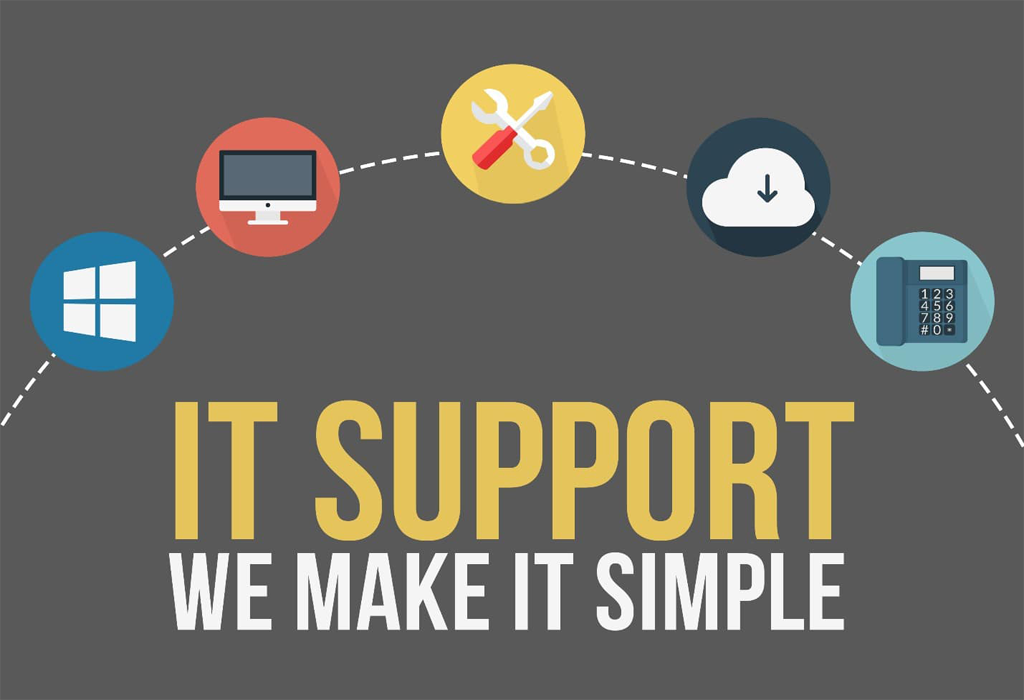Why Would A Business Outsource Their IT Support?
Let’s start with what is IT Support? The answer is really simple!
IT stands for ‘Information Technology’ and covers a broad range of areas, such as the Internet, websites, telecommunications, basically any device or technology you might be using at work or homes such as your computer, laptop, and handheld device.
When someone starts exploring the idea of IT department outsourcing, they generally want to figure out why they need to outsource your IT support, what IT services should be outsourced, and what would be the benefits of outsourcing IT technical support.
Here are the top 3 topics:
- Why Outsource Your IT Support?
- What IT Services Can Be Outsourced?
- What Are the Advantages and Benefits of Outsourcing IT Technical Support?
Why Outsource Your IT Support?
Outsourcing IT support is generally considered for one of four reasons: Your IT department is too busy and/or needs additional help. You’re tired of managing an internal IT department. Your IT department isn’t producing the results you want for the investment you’re making in your business. You want to reduce your overall technology support costs and get better results.
What IT Services Can Be Outsourced?
These days, almost any task that could be done by an internal IT department can be outsourced. That’s not to say that there isn’t value in an internal IT department, but the IT needs of today’s businesses have changed, making outsourcing some or all IT tasks a very attractive option.
You can outsource all kinds of IT Services, including, but not limited to:
- IT Strategy, Budgeting, and Technology Planning
- 24/7 Onsite and Remote End-User Support
- Technology Recommendations
- IT Steering Committee
- Network Administration
- Reactive Support Services
- Network Operations Center (NOC)
- Patch Management
- Web Filtering
- Help Desk Services
- IT Security Threat Prevention and Remediation
- Spam Filtering
- Network Installation
- IT Management
- On-site and Remote Support
- Root Cause Investigation
- IT Project Management
- Task Accountability
- Infrastructure Upgrades
- Technology Rollouts
- Backup Management & Administration
- New User Setup & Training
- Secure Employee Termination
- Best Practice Implementation
- Cloud Computing
- Network Management
The kind of IT department outsourcing that produces the best results for Southern California small and midsize businesses is generally a fixed-fee managed IT services agreement. These agreements come in several varieties depending on what you’re looking for, and whether or not you would like to retain some internal IT staff.
The best type of managed IT services arrangement gets you the best possible IT results with the right investment.
Related: Get the Guide to IT Support Services and learn how filling the gaps in your IT capability can help you meet your business goals.
What Are The Advantages Of Outsourcing IT Technical Support?
There are many benefits and advantages to outsourcing your IT department to a managed IT services provider.
A Financial Incentive For Results – IT providers work on a contract basis, which means that they are financially motivated to keep you happy. Also, fixed-fee arrangements only work out for both parties when things are maintained properly and unforeseen problems DON’T happen. This means your employees will keep working since their IT team is working diligently in the background making sure everything stays in tip-top shape.

IT Is Their Core Competency – All of the day-to-day tasks, such as installation of hardware and software, information systems, security tasks, network administration, maintenance, upgrades, technology management, etc. are taken care of by IT professionals. They’ve spent millions of dollars developing best practices and customizing management tools so you don’t have to.
Consistent Results – Outsourcers are already in the business of measuring their own activity, so it’s in their business interest to try to make IT consistently better for their clients. Also, vendor results are typically watched more closely than those of employees, so the outsourcer has to be consistently excellent.
Resources Are Rapidly Scalable. If you experience a bunch of problems at once, an IT firm will be able to quickly allocate many representatives to solve the problems simultaneously. This means multiple employees can get help from different IT technicians at the same time. And when things are working smoothly, nobody is being paid to sit and wait for the phone to ring. This reduces downtime and improves employee productivity.
They Have The Right, Trained Experts For The Job. IT as a category contains many disciplines: security, cloud, storage, communications, networking, ERP, EMR, accounting software, etc. Most small businesses can’t afford to employ experts in each of these areas. Hiring someone who is a Help Desk specialist and expecting them to manage your network is like hiring a machinist and expecting them to also handle accounting. When you use a managed IT services provider, these experts are easily accessible because the cost of employing each one of them is distributed amongst each one of their clients.
As with any business decision, there are also potential downsides to outsourcing IT.










